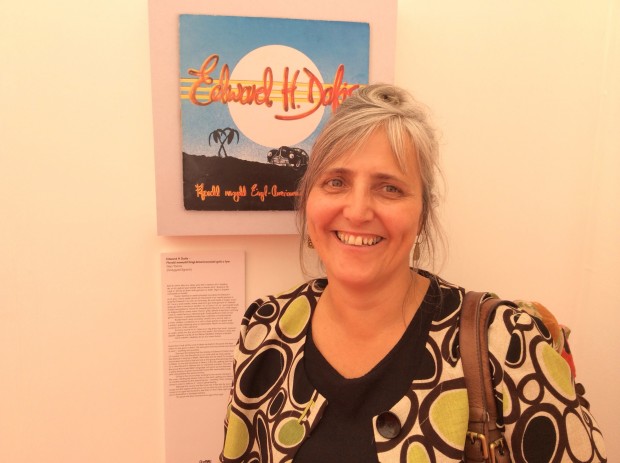I knew she was an interesting woman when I saw her looking at the Welsh album covers exhibition, next to Caffi Maes B. She looked very concentrated, as if she was trying to find “the one” that brought her memories from her youth. I allowed myself to disturb her in her search just to ask her a couple of questions; but the conversation was so fluid that we ended up talking for more than half an hour.
Her name is Jên Dafis. She’s from the Vale of Glamorgan and she’s been coming to the National Eisteddfod since she was 18. “I’ve only missed one since then!”, she says full of proud.
She has come this year with one of her children, the youngest one. Her other two are “travelling the world” but they call her mother everyday to know all the news from the Maes. Although they are not here this time, they still want to feel part of the celebration.
For this 52 year old woman the National Eisteddfod is like a pilgrimage, she says that coming here energises her for another year. She wasn’t raised this way, though. Her first memory of the festival is when she was 12 and she sang with the school at the Camarthen National Eisteddfod. But she says that it wasn’t until she turned 18 that she realised how important it was to preserve Welsh culture. Since then, she’s been a committed supporter of the festival.
When I ask her about her best memory at a National Eisteddfod she’s unable to give just one answer. “There are too many ‘wow moments’ every year”, she says. But for her one of the highlights is always the Crowning of the Bard because it shows how healthy and unique Welsh culture is.
Then we keep talking about her life, about how much she likes the country I am from … but in the course of our conversation she gives me one of the best descriptions of the National Eisteddfod I have heard so far: “It’s a way to celebrate who you are”.
Before letting her go, I ask her whether she found the cover she was looking for. She did. It’s Hen Ffordd Gymreig O Fyw, by Edward H. Dafis. Curiously enough, an album released in 1974, the year of her first memory at the National Eisteddfod.



Comment on this article